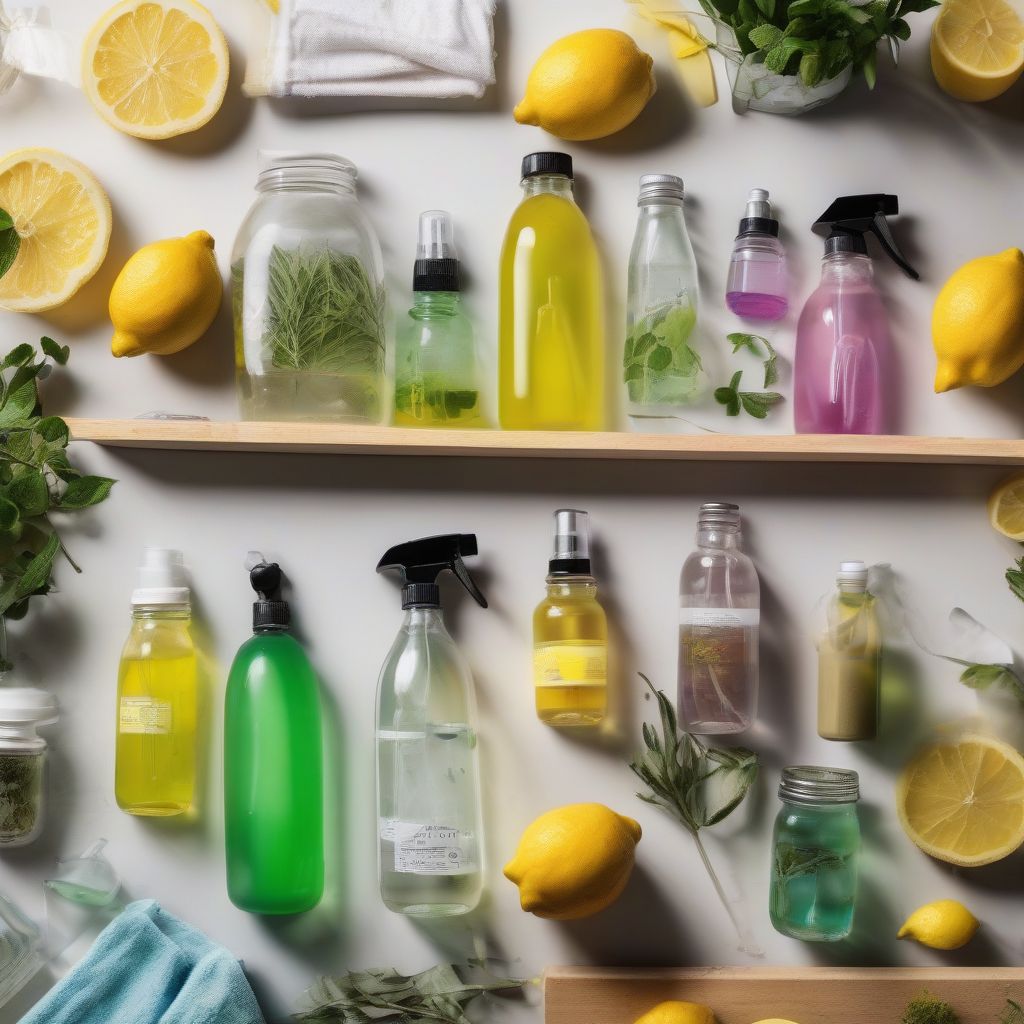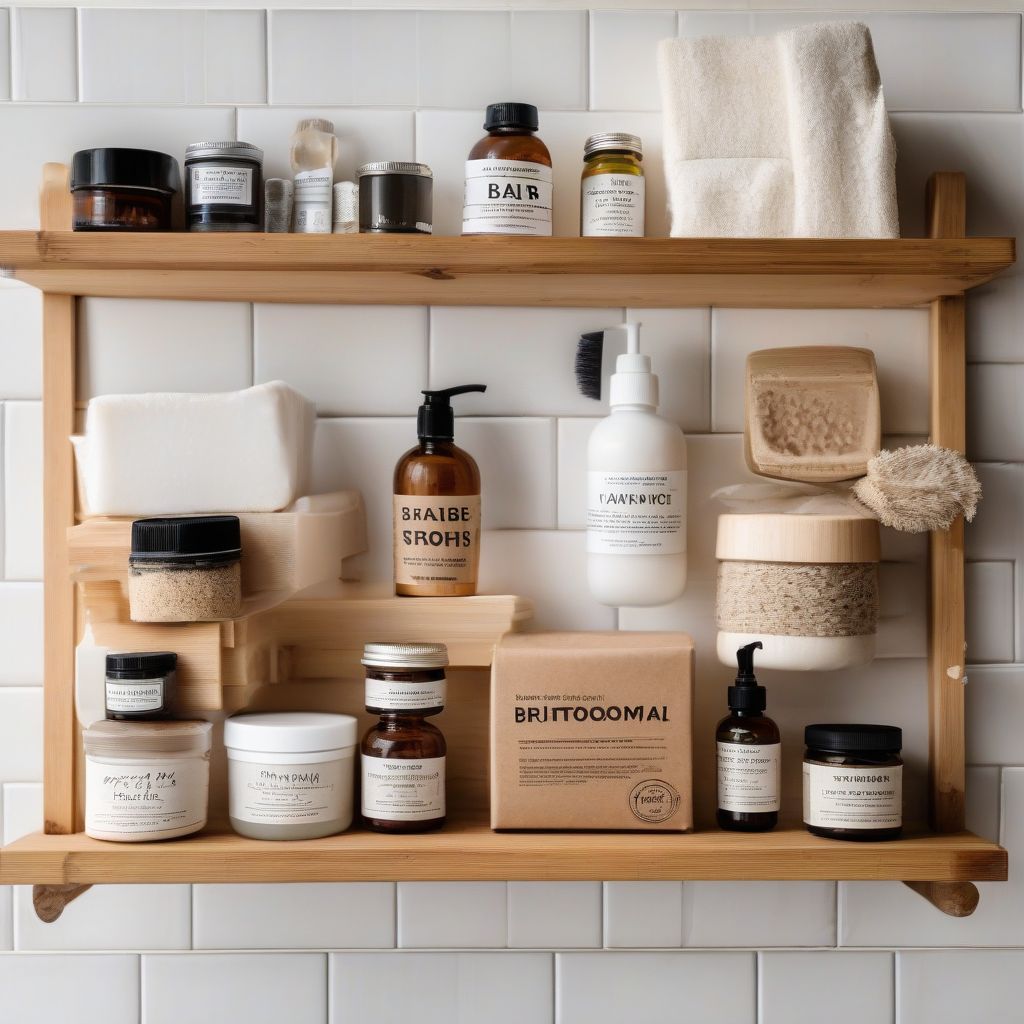Have you ever stopped to think about the mountains of plastic bottles and containers piling up in landfills, leaching harmful chemicals into our environment? It’s a sobering thought, isn’t it? Now, imagine a world where your kitchen and bathroom cabinets are stocked with beautifully-crafted, reusable containers, and the air is filled with the refreshing scent of homemade cleaners. That’s the power of embracing a zero-waste lifestyle, and the best part? It’s easier than you think to make your own zero-waste household products.
As a nutritionist and meal prepping coach, I’m passionate about helping people make healthier choices, and that extends beyond just food. Creating a zero-waste home is about nourishing our planet as much as we nourish our bodies. It’s a journey of small steps, simple swaps, and consciously choosing sustainability.
In this guide, I’ll walk you through the why, what, and how of making your own zero-waste household products. We’ll explore the environmental impact, discover easy recipes, and unlock the secrets to a cleaner, greener home.
Why Ditch the Disposables? Embracing a Zero-Waste Philosophy
Our modern lifestyle is heavily reliant on single-use plastics and disposable products, leading to a massive waste problem. Every plastic toothbrush, every cleaning wipe, every plastic-wrapped soap bar contributes to this ever-growing issue. By choosing to make our own zero-waste alternatives, we can significantly reduce our environmental footprint and embrace a more sustainable way of life.
The Benefits of Going Zero-Waste:
- Reduced Environmental Impact: Less waste means less strain on our landfills and reduced pollution in our oceans and ecosystems.
- Healthier Homes: Many commercial cleaners contain harsh chemicals that can be harmful to our health. Natural DIY alternatives are gentler and safer for you and your family.
- Cost-Effective: Making your own cleaning products is surprisingly affordable, saving you money in the long run.
- Sense of Accomplishment: There’s a sense of pride and accomplishment that comes from creating something with your own hands and knowing you’re making a positive difference.
Your Zero-Waste Starter Kit: Essential Ingredients and Tools
Ready to get started? You don’t need a fancy laboratory to whip up effective and eco-friendly cleaning solutions. Here’s a list of basic ingredients and tools you’ll need:
Ingredients:
- White Vinegar: A natural disinfectant and deodorizer
- Baking Soda: A gentle abrasive cleaner and odor absorber
- Castile Soap: A plant-based soap that’s biodegradable and versatile
- Essential Oils: Add a refreshing scent and antibacterial properties (optional)
- Citrus Peels: Natural cleaning agents and deodorizers (especially lemon and orange)
- Water: Your base for most cleaning solutions
Tools:
- Glass Spray Bottles: Reusable and perfect for storing your homemade cleaners
- Glass Jars: Ideal for storing dry ingredients and concoctions
- Measuring Cups and Spoons: For accurate measurements
- Funnel: For easy pouring
- Labels: Clearly label your creations
 Homemade Cleaning Supplies
Homemade Cleaning Supplies
Zero-Waste Recipes for a Sparkling Home
Now for the fun part: let’s get mixing! Here are some simple yet effective recipes for creating your own zero-waste household products:
1. All-Purpose Cleaner: Your Cleaning Hero
This versatile cleaner can tackle most surfaces in your home, leaving them sparkling clean.
Ingredients:
- 1 cup white vinegar
- 1 cup water
- 10 drops essential oil (optional, lemon or tea tree oil recommended)
Instructions:
- Combine all ingredients in a spray bottle.
- Shake well before each use.
2. Bathroom Cleaner: Banishing Grime Naturally
Say goodbye to stubborn soap scum and mildew with this powerful bathroom cleaner.
Ingredients:
- 1 cup white vinegar
- 1/2 cup baking soda
- 1 tablespoon castile soap
- 10 drops tea tree essential oil (optional)
Instructions:
- In a spray bottle, combine vinegar, castile soap, and essential oil (if using).
- In a separate bowl, mix baking soda with a small amount of water to form a paste.
- Spray the vinegar mixture on bathroom surfaces, then apply the baking soda paste. Let it sit for 10-15 minutes.
- Scrub with a sponge or brush and rinse thoroughly.
3. DIY Laundry Detergent: Fresh and Clean Clothes
Ditch the harsh chemicals and embrace a gentler way to wash your clothes.
Ingredients:
- 2 cups washing soda
- 2 cups borax
- 1 bar castile soap, grated
Instructions:
- Grate the castile soap and combine it with the washing soda and borax.
- Store in an airtight container.
- Use 1-2 tablespoons per load of laundry.
4. Natural Dishwasher Detergent: Sparkling Dishes, Naturally
Keep your dishes sparkling clean with this homemade dishwasher detergent.
Ingredients:
- 1 cup washing soda
- 1 cup borax
- 1/2 cup citric acid
- 1/4 cup coarse sea salt
Instructions:
- Combine all ingredients in a bowl and mix well.
- Store in an airtight container.
- Use 1-2 tablespoons per load in the detergent compartment of your dishwasher.
5. Citrus Peel Cleaner: A Breath of Freshness
Don’t throw away those citrus peels! Turn them into a potent and fragrant cleaner.
Ingredients:
- Citrus peels (lemon, orange, or grapefruit)
- White vinegar
Instructions:
- Fill a glass jar loosely with citrus peels.
- Pour white vinegar over the peels, ensuring they’re fully submerged.
- Seal the jar and let it sit in a cool, dark place for 2-3 weeks, shaking occasionally.
- Strain the mixture into a spray bottle.
6. DIY Hand Soap: Gentle and Effective Cleansing
Pamper your hands with this gentle and moisturizing hand soap.
Ingredients:
- 1 cup liquid castile soap
- 1 tablespoon carrier oil (almond, jojoba, or olive oil)
- 10-15 drops essential oil (optional, lavender or tea tree oil recommended)
Instructions:
- In a foaming soap dispenser, combine all ingredients.
- Shake well before each use.
 DIY Zero Waste Bathroom Essentials
DIY Zero Waste Bathroom Essentials
[amazon bestseller=”zero waste bathroom starter kit”]
Tips for Embracing a Zero-Waste Lifestyle
Creating a truly zero-waste home is an ongoing journey, and it’s about making conscious choices in all aspects of your life. Here are some additional tips to help you reduce waste:
- Choose Reusable Alternatives: Swap disposable paper towels for reusable cloth napkins, plastic wrap for beeswax wraps, and plastic bags for reusable shopping bags.
- Compost Food Scraps: Start composting to reduce food waste and create nutrient-rich soil for your garden.
- Shop in Bulk: Reduce packaging waste by shopping for groceries in bulk, bringing your own containers.
- Support Eco-Conscious Brands: Choose products from companies that prioritize sustainability and ethical practices.
- Repair and Repurpose: Before discarding items, consider whether you can repair or repurpose them. Get creative and give old items a new lease on life!
Conclusion: Embark on Your Zero-Waste Journey
Transitioning to a zero-waste lifestyle is a rewarding journey that benefits both our planet and our well-being. By making small changes, adopting DIY solutions, and embracing a mindful approach to consumption, we can significantly reduce our environmental footprint and create a healthier, more sustainable future.
Remember, every step you take, no matter how small, makes a difference. What zero-waste swaps will you make today?
